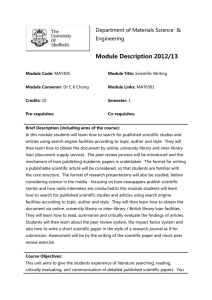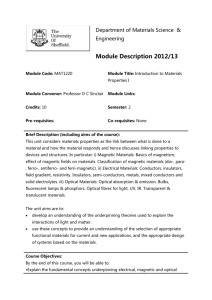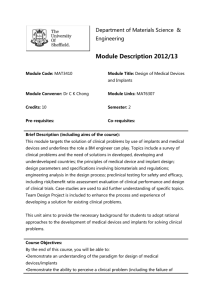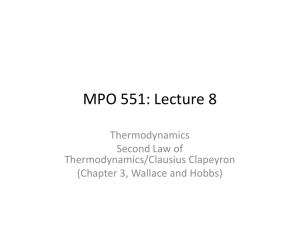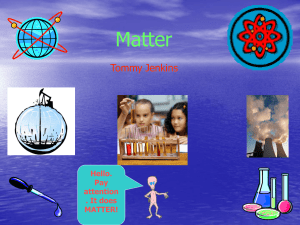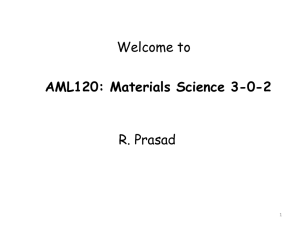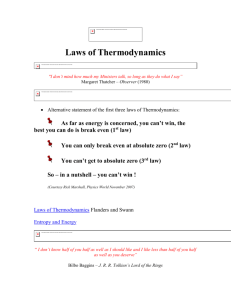Module Description 2011/12
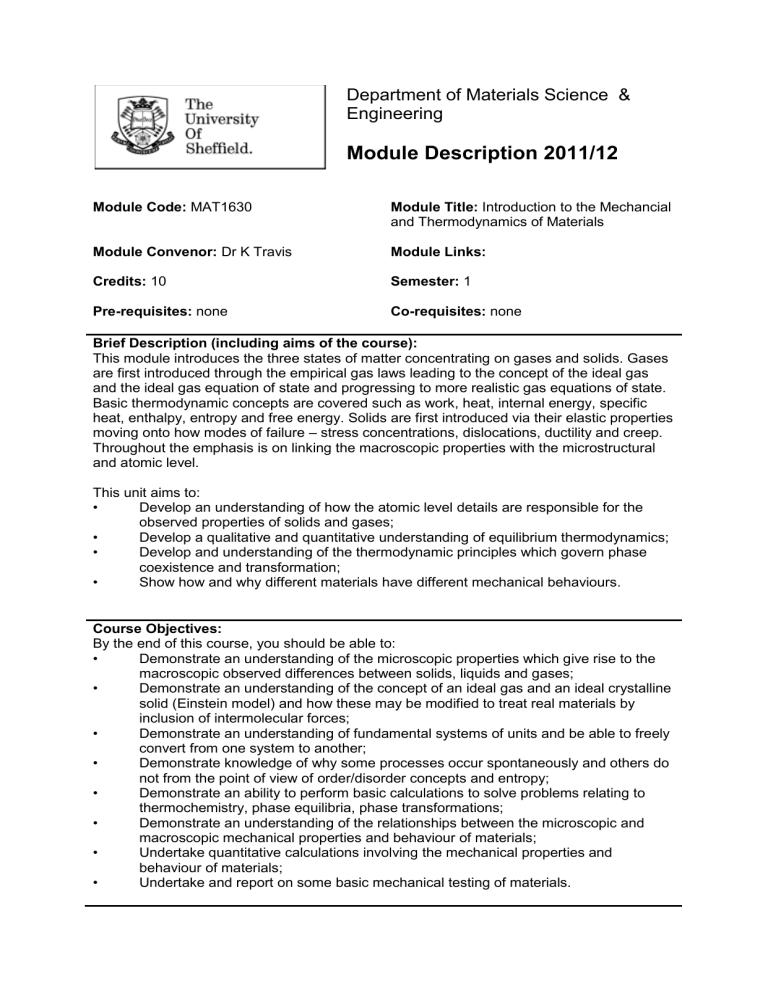
Department of Materials Science &
Engineering
Module Description 2011/12
Module Code: MAT1630
Module Convenor: Dr K Travis
Credits: 10
Pre-requisites: none
Module Title: Introduction to the Mechancial and Thermodynamics of Materials
Module Links:
Semester: 1
Co-requisites: none
Brief Description (including aims of the course):
This module introduces the three states of matter concentrating on gases and solids. Gases are first introduced through the empirical gas laws leading to the concept of the ideal gas and the ideal gas equation of state and progressing to more realistic gas equations of state.
Basic thermodynamic concepts are covered such as work, heat, internal energy, specific heat, enthalpy, entropy and free energy. Solids are first introduced via their elastic properties moving onto how modes of failure – stress concentrations, dislocations, ductility and creep.
Throughout the emphasis is on linking the macroscopic properties with the microstructural and atomic level.
•
•
•
This unit aims to:
• Develop an understanding of how the atomic level details are responsible for the observed properties of solids and gases;
Develop a qualitative and quantitative understanding of equilibrium thermodynamics;
Develop and understanding of the thermodynamic principles which govern phase coexistence and transformation;
Show how and why different materials have different mechanical behaviours.
Course Objectives:
By the end of this course, you should be able to:
• Demonstrate an understanding of the microscopic properties which give rise to the
•
•
• macroscopic observed differences between solids, liquids and gases;
Demonstrate an understanding of the concept of an ideal gas and an ideal crystalline solid (Einstein model) and how these may be modified to treat real materials by inclusion of intermolecular forces;
Demonstrate an understanding of fundamental systems of units and be able to freely convert from one system to another;
Demonstrate knowledge of why some processes occur spontaneously and others do
• not from the point of view of order/disorder concepts and entropy;
Demonstrate an ability to perform basic calculations to solve problems relating to
•
•
• thermochemistry, phase equilibria, phase transformations;
Demonstrate an understanding of the relationships between the microscopic and macroscopic mechanical properties and behaviour of materials;
Undertake quantitative calculations involving the mechanical properties and behaviour of materials;
Undertake and report on some basic mechanical testing of materials.
Assessment:
Exam: 80%
Lab Report: 20%
Booklist (A) Core Test; (B) Secondary Text; (C) Peripheral Reading:
(A) The Little Book of Thermodynamics, Steve Beck (a reference book available from
Mechanical Engineering).
(B) Atkins’ Physical Chemistry, P. Atkins
(B) Heat and Thermodynamics, M. Zemanski
(B) Solids, Liquids and Gases, Tabor.
UK-SPEC Learning Outcomes
Please insert an 'x' in the table below against all learning outcomes that are delivered in the module. N.B. The suffix 'm' indicates learning outcomes that are characteristic of the enhanced outcomes expected of MENG graduates.
LEARNING
OUTCOME DESCRIPTION
US1
US1m
Knowledge & understanding of scientific principles & methodology necessary to underpin their education in their engineering discipline, to enable appreciation of its scientific and engineering context, & to support their understanding of the historical, current & future developments and technologies
A comprehensive understanding of the scientific principles of own specialisation & related disciplines
US2
BENG MENG
Knowledge & understanding of mathematical principles necessary to underpin their education in their engineering discipline and to enable them to apply mathematical methods, tools & notations proficiently in the analysis & solution of engineering problems
US2m
US3
An awareness of developing technologies related to own specialisation
Ability to apply & integrate knowledge & understanding of other engineering disciplines to support study of their own engineering discipline
US3m
US4m
A comprehensive knowledge & understanding of mathematical & computer models relevant to the engineering discipline, and an appreciation of their limitations
An understanding of concepts from a range of areas including some outside engineering, and the ability to apply them effectively in engineering projects
E1
Understanding of engineering principles and the ability to apply them to analyse key engineering processes
E1m
E2
E2m
An ability to use fundamental knowledge to investigate new & emerging technologies
Ability to identify, classify and describe the performance of systems & components through the use of analytical methods & modelling techniques
Ability to apply mathematical & computer-based models for solving problems in engineering, & the ability to assess the limitations of particular cases
E3
Ability to apply quantitative methods & computer software relevant to their engineering discipline, in order to solve engineering
S2
S2m
S3
S4
E3m
E4
D1
D1m
D2
D2m
D3
D4
D5
D6
S1
S1m
S5 problems
Ability to extract data pertinent to an unfamiliar problem, & apply in its solution using computerbased engineering tools when appropriate
Understanding of & ability to apply a systems approach to engineering problems
Investigate & define a problem & identify constraints including environmental & sustainability limitations, health & safety & risk assessment issues
Wide knowledge & comprehensive understanding of design processes & methodologies & the ability to apply & adapt them in unfamiliar situations
Understand customer & user needs & the importance of considerations such as aesthetics
Ability to generate an innovative design for products, systems, components or processes to fulfil new needs
Identify & manage cost drivers
Use creativity to establish innovative solution
Ensure fitness for purpose for all aspects of the problem including production, operation, maintenance & disposal
Manage the design process & evaluate outcomes
Knowledge & understanding of commercial & economic context of engineering processes
Extensive knowledge & understanding of management & business practices, & their limitations, & how these may be applied appropriately
Knowledge of management techniques, which may be used to achieve engineering objectives within that context
The ability to make general evaluations of commercial risks through some understanding of the basis of such risks
Understanding of the requirement for engineering activities to promote sustainable development
Awareness of the framework of relevant legal requirements governing engineering activities, including personnel, health, safety, & risk
(including environmental risk) issues
Understanding of the need for a high level of professional & ethical conduct in engineering
P1
P1m
P2
P2m
P3
P3m
P4
P5
P6
P7
P8
Knowledge of characteristics of particular materials, equipment, processes, or products
A thorough understanding of current practice & its limitations, & some appreciation of likely new developments
Workshop & laboratory skills
Extensive knowledge & understanding of a wide range of engineering materials & components
Understanding of contexts in which engineering knowledge can be applied (e.g. operations & management, technology development, etc)
Ability to apply engineering techniques taking account of a range of commercial & industrial constraints
Understanding use of technical literature & other information sources
Awareness of nature of intellectual property & contractual issues
Understanding of appropriate codes of practice
& industry standards
Awareness of quality issues
Ability to work with technical uncertainty
